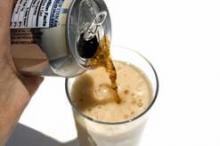ATLANTA – Diet drinks might be protective rather than causative in cardiometabolic diseases such as obesity and type 2 diabetes, but definitive data are lacking.
"I would say that based on the scientific evidence to date, it might be a good idea to switch to artificially sweetened beverages, but I don’t see the evidence to either promote or avoid them," said Mark Pereira, Ph.D., of the School of Public Health at the University of Minnesota, Minneapolis.
There are data linking sugar-sweetened beverages to metabolic disorders. Findings from a recent, small, but "pretty provocative" randomized pilot study point to a relationship between sugar-sweetened beverages’ strong effect on visceral fat, particularly in the intra-abdominal cavity, he said. Diet drinks were not found in the study to have a positive association with this kind of adiposity (Am. J. Clin. Nutr. 2012;95:283-9).
The significance of this is that visceral adipose tissue in the gut "is consistent with a higher cardiometabolic risk profile," he said at Obesity Week, presented by the Obesity Society and the American Society for Metabolic and Bariatric Surgery.
The study supports findings from the National Heart, Blood, and Lung Institute’s prospective Coronary Artery Risk Development in Young Adults (CARDIA) study of 3,000 individuals. Imaging done across the cohort at year 25 of the study showed a weak association between artificially sweetened beverages and the volume of fat in the visceral cavity, but a "really, really strong" association with sugar-sweetened beverages and visceral cavity adipose tissue, said Dr. Pereira.
"If you look at the true drivers of metabolic risk, the visceral fat, it’s not there with the artificially sweetened drinks, it’s only there with the sugar-sweetened ones," he said.
Although both diet and sugar-sweetened drinks have positive associations with incident diabetes and other metabolic disturbances, the relationship between "diet drinks and cardiometabolic risk may be an anomaly of reverse causality," Dr. Pereira said.
While findings from the CARDIA study show an association between waist circumference and consumption of diet drinks, there was not an association with blood sugar, lipids, or blood pressure. "So, the question is, ‘Why isn’t [diet drink consumption] driving the risk factors?" asked Dr. Pereira.
The reason may be that consumers of high amounts of diet drinks "are more likely to be overweight and obese, and are more likely to be at high risk for chronic disease so they choose beverages with low calories to try to lower their risk," he suggested.
However, the extent of reverse causality in this patient population, said Dr. Pereira, is still unknown: "There could be an increased risk [of cardiometabolic disease] with a higher intake of artificially sweetened drinks, but you could also say it is protective."
The lack of certainty, according to Dr. Pereira, is due to a drought of data from well designed studies.
"I argue with some of my colleagues who believe that we can learn just as much or more on this from observational prospective epidemiological studies," he said, adding, "I am kind of steadfast that this is a topic that should be clearly addressed in terms of mechanisms and causality through better randomized controlled trials."
Dr. Pereira reported he has received support from the Robert Wood Johnson Foundation.



